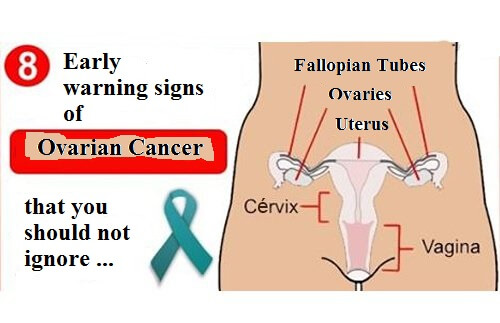8 Early Signs of Ovarian Cancer You Shouldn't Ignore

Ovarian cancer has been dubbed the “silent murderer”. This is because the signs of ovarian cancer may appear when the disease is already advanced and harder to treat. This type of cancer is the second most common gynecological cancer among women. Still, it has a higher mortality rate because doctors find it once it’s too late. Find out what you need to know about the early signs of ovarian cancer you shouldn’t ignore.
According to recent reports, only 50% of women who receive an ovarian cancer diagnosis survive up to 5 years. Indeed, this is because doctors detect it at an advanced stage. However, early detection increases life expectancy up to 95%.
Ovarian cancer can occur in women of any age, but the risk increases from age 50 and older. In addition, women over 65 are the most at risk. It’s important to learn about some of the symptoms of possible ovarian cancer. But first, remember to consult your doctor if you experience these red flags since they can also be related to other health problems.
This might interest you: 7 Ovarian Cancer Symptoms Every Women Should Know
Warning signs of ovarian cancer

These symptoms have been linked to ovarian cancer, but can also be signs of other health problems. Knowing about and recognizing them can be key to detecting the disease early and to receiving timely treatment.
- Abdominal bloating or swelling: Although common for a variety of health problems, a swollen stomach and a larger abdomen could indicate ovarian cancer. If you notice this problem often, you should consult with a doctor.
- Digestive symptoms: In addition bloating, indigestion, constipation, abdominal cramps, and discomfort are also warning signs. Also, keep an eye out for any changes in your bowel habits.
- Pelvic pain: pelvic pain can be a very important sign of this disease. If the pain is frequent and seems to come for no reason, consult with a doctor and avoid covering it up with painkillers.
- Back pain: If you experience pain in your lower back and have no explanation for it.
Additional symptoms
- Frequent and uncontrolled urination: If all of a sudden you feel the urge to urinate often and you almost can’t control it, something may not be right. Often, these complaints come with pain or burning while urinating and frequent urination in short intervals. This may indicate a weakness of the pelvic floor muscles or be clear symptoms of a urinary tract infection (UTI). Still, it’s important to consult with a doctor, since it can also be a common symptom of ovarian cancer.
- Unexplained weight gain or loss: many women often feel very happy when they lose weight for no reason. Still, they should know that this it’s not normal and may be a sign that something is very wrong. The same is true when there is unexplained weight gain. You can also be less hungry or feel full all the time.
- Fatigue: people may feel tired due to many health issues and even stress. Still, it’s also quite common when you have ovarian cancer. You may feel weak, tired, and a lack of energy quite often. Indeed, this is a sign that something isn’t right.
- Pain during sex: if instead of enjoying sexual intercourse you often suffer from pain, consult with your doctor as this is also a red flag.
Read more on: 11 Causes of Pain During Sexual Intercourse
Other symptoms to keep in mind
- Vaginal bleeding in postmenopausal women
- Nausea or vomiting
- Anemia
- Frequent stomach pain
Ovarian cancer diagnosis

In conclusion, ovarian cancer is hard to detect since symptoms don’t usually appear in the early stages of the disease. Still, if you have some of the symptoms we’ve listed above, consult with a physician. They can help you diagnose it early through ultrasound, tomography (CT), magnetic resonance imaging (MRI), and a blood test called CA-125.
All cited sources were thoroughly reviewed by our team to ensure their quality, reliability, currency, and validity. The bibliography of this article was considered reliable and of academic or scientific accuracy.
- Balasubramaniam, K., Ravn, P., Larsen, P. V., Søndergaard, J., & Jarbøl, D. E. (2015). Specific and unspecific gynecological alarm symptoms – Prevalence estimates in different age groups: A population-based study. Acta Obstetricia et Gynecologica Scandinavica. https://doi.org/10.1111/aogs.12538
- Gubbels, J. A., Claussen, N., Kapur, A. K., Connor, J. P., & Patankar, M. S. (2010). The detection, treatment, and biology of epithelial ovarian cancer. Journal of Ovarian Research. https://doi.org/10.1186/1757-2215-3-8
- Lockwood-Rayermann, S., Donovan, H. S., Rambo, D., & Kuo, C. W. J. (2009). Original research: Women’s awareness of ovarian cancer risks and symptoms. American Journal of Nursing. https://doi.org/10.1097/01.NAJ.0000360309.08701.73
This text is provided for informational purposes only and does not replace consultation with a professional. If in doubt, consult your specialist.








